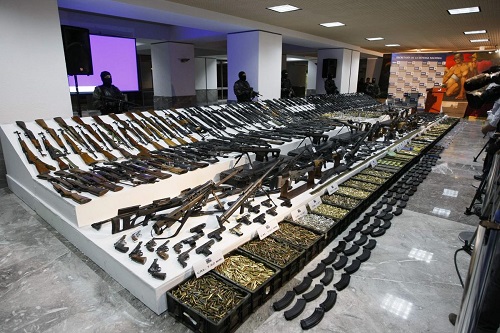AP photo
By
Ricardo Swire
Caribbean intelligence data’s updated analysis of gun trafficking patterns identified the United States as main point of origin for half the confiscated illegal guns in Honduras and Central America. Honduras is the most vulnerable and problematic due to shortcomings in management and administration of the national Armory, where officials are not obliged to conduct criminal antecedents on firearms purchasers. Weapons and ammunition sales are major revenue earners for the military pension fund. Such dependency is a problematic incentive for the Armory to capitalize on gun sales.
America has sixty thousand licensed firearms dealers, who retail an estimated two hundred and sixty-five million civilian firearms. In January 2016 the US Government Accountability Office Report GAO-16-223 criticized the Alcohol, Tobacco, Firearms & Explosives (ATF) plus border protection agencies for “failure to adequately coordinate anti-gun trafficking efforts.” The US National Rifle Association (NRA) consistently opposes all official measures to reduce cross-border gun trafficking. The NRA has also lobbied to prevent passage of legislation that would create new anti-trafficking statutes and enrol the US in global small-arms control treaties.
By the end of 2016 Honduran Customs officials had seized forty illegal guns monthly, increased from two point five interceptions in 2011. Choice smuggling methods were contraband weaponry camouflaged either inside luggage or commercial imports. Intercepted guns submitted to the ATF for tests were sourced from America. Between 2014 and 2015 alone five thousand, nine hundred and twenty-eight illegal guns were traced to the USA. Internal security reports verified that traffickers, working for organized criminal networks, financially entice relevant Honduran government officials to turn a blind eye.
In the recent past a salvage ship, managed by Aqua Quest International Inc based in Tarpon Springs Florida, docked in Puerto Lempira after conducting a private recovery operation in Honduran territorial waters. Acting on shared intelligence Honduran National Police officers boarded and searched the ship at the quayside. Six Americans were arrested and charged with illegal possession of firearms. The ship was impounded and the gunrunners detained for more than three weeks in a Honduran prison. The illegal firearms cache labeled “commercial” included one semi-automatic weapon.
In one 2017 law enforcement illegal gun bust an Ohio gun shop owner was monitored as he sold guns to a clandestine group of Hondurans. These weapons included sixty-two Barrett .50 caliber rifles, identical to guns used by US Navy SEAL snipers, each sold for US$8,000. The Hondurans drove to McAllen Texas and across the Rio Grande with the guns in car trunks. Last year the US Department of Justice’s (DOJ) Inspector-General report excoriated the ATF and Drug Enforcement Administration (DEA). The senior official accused both federal agencies of failing to interdict guns smuggled from Texas to Mexico. Los Zetas drug cartel members used similar guns to kill one known American Immigration & Customs Enforcement (ICE) agent.
Ricardo Swire
Ricardo Swire is the Principal Consultant at R-L-H Security Consultants & Business Support Services and writes on a number of important issues.



No Comments Yet!
You can be first to comment this post!